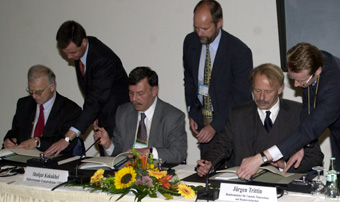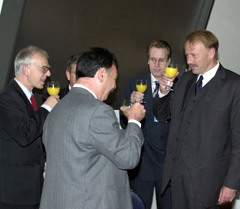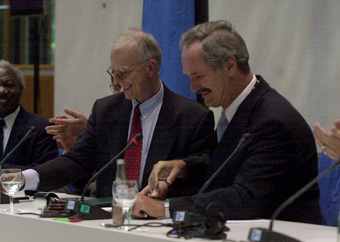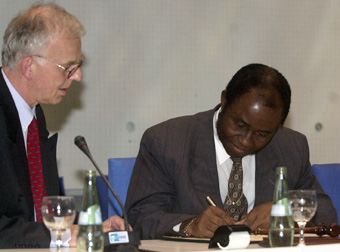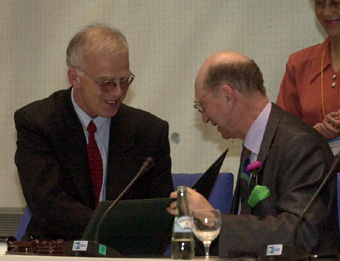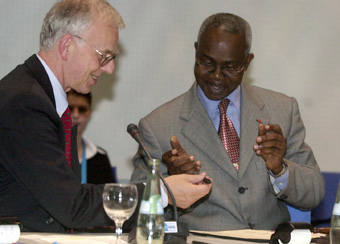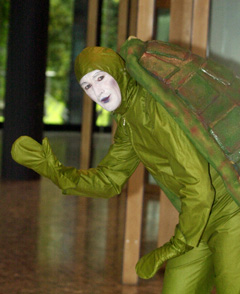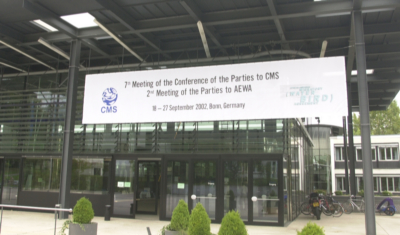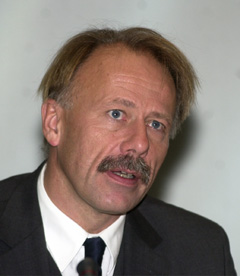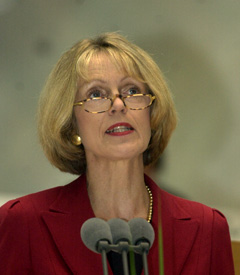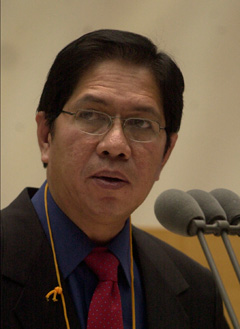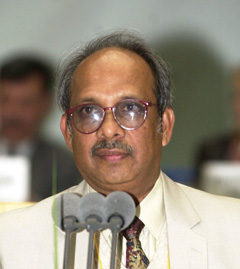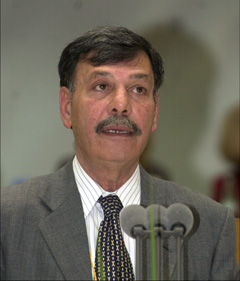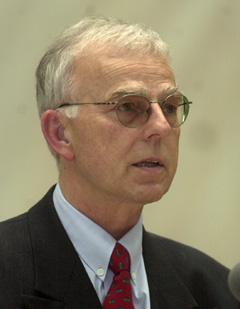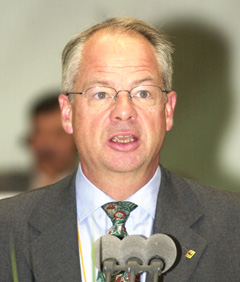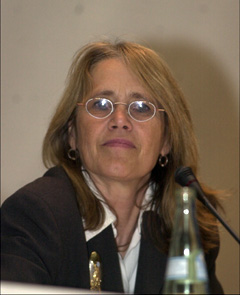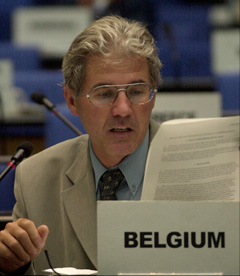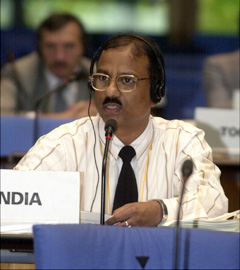|
|
 |
 |
|
Wednesday, 18 September 2002
The seventh Conference of the Parties (COP-7) to the Convention on the Conservation of Migratory Species of Wild Animals (CMS) and the second Meeting of the Parties (MOP-2) to the African-Eurasian Migratory Waterbirds Agreement (AEWA) opened in a joint ceremony on Wednesday morning. Prior to the joint opening, the Federal Republic of Germany and the CMS Secretariat signed the CMS Headquarters Agreement, officially establishing Bonn as the CMS Secretariat's headquarters. Following the welcoming speeches, delegates met in Plenary to begin considering CMS COP-7's agenda, including items on administrative matters and reports from the various CMS bodies. In the afternoon, they convened in a Committee of the Whole (COW) to begin reviewing implementation of the Strategic Plan 2000-20005.
|
 |
 |
|
Jürgen Trittin, Federal German Minister for the Environment, Nature Conservation and Nuclear Safety, welcomed delegates to Bonn for the opening of the CMS and AEWA meetings. He highlighted climate change as a major threat to migratory species, noting that the German Government has committed 500 million Euros for climate change reduction programmes, including increasing the market share of solar and wind power.
|
 |
 |
|
Bärbel Dieckmann, Mayor of Bonn, observed that CMS COP-7 was the first post-WSSD conference. She drew attention to Bonn's role as the host of various international conferences, as well as the home of many national and international governmental and non-governmental institutions, and highlighted the February 2002 Agreement between Germany and the UN to establish a UN campus in Bonn.
|
|
 |
 |
 |
|
AGENDA AND WORK SCHEDULE: Delegates adopted the list of documents for the meeting (UNEP/CMS/Conf.7.2 (Rev.3)), the provisional and annotated agendas (UNEP/CMS/Conf.7.1 (Rev.1), and 7.1.1) and the provisional schedule (UNEP/CMS/Conf.7.3) without amendments.
|
|
|
ESTABLISHMENT OF COMMITTEES: Diana Mortimer (UK), Robert Boljesic (Slovenia), Hany Tatwany (Saudi Arabia), Mohammed Ibrahim Mohammed (Egypt) and Nancy Cespedes (Chile) were elected members of the Credentials Committee. The Committee appointed Hany Tatwany (Saudi Arabia) as its Chair.
|
|
|
ADMISSION OF OBSERVERS: Participants agreed to admit as observers the six Scientific Council experts appointed by the COP, as well as inter-governmental (IGOs) and non-governmental organizations (NGOs).
|
|
|
|
OPENING STATEMENTS: CMS COP-7 Chair Altmann requested observer countries to comment on the prospects of their accession to the Convention. BANGLADESH said it hopes to sign the CMS by the end of COP-7. NEPAL, VIETNAM, SIERRA LEONE and COTE D'IVOIRE indicated that they would ratify before COP-8. DJIBOUTI stated that it would join within a few weeks or months. INDONESIA noted economic and other problems hindering its work on CMS ratification, but said that a consultative process had been initiated.
|
|
|
|
REPORTS: Secretariat: Introducing the Secretariat's report (UNEP/CMS/Conf.7.5.1), CMS Executive Secretary Müller-Helmbrecht drew attention to: contacts made with non-parties to encourage membership; the new Headquarters Agreement; administrative arrangements with the AEWA, ASCOBANS and EUROBATS Secretariats; cooperation with other inter-governmental (IGOs) and non-governmental organizations (NGOs); and a decrease in Secretariat staff and need for funding.
|
|
|
|
Standing Committee: Demetrio Ignacio, Standing Committee Chair, introduced the Standing Committee's report (UNEP/CMS/Conf.7.5.2 and Inf.7.6) and highlighted the strengthening of the CMS through, inter alia, enhancement of efforts, the new Headquarters Agreement, recognition of the CMS as the Convention on Biological Diversity's (CBD) lead partner, and increased participation in the CMS process due to travel assistance.
|
|
|
Scientific Council: Scientific Council Chair Colin Galbraith presented the Council's report (UNEP/CMS/Conf.7.5.3), noting increased participation in the past triennium. The Council considered proposals for listing species in Appendices I and II, adhering strictly to scientific principles and the best available knowledge.
|
|
|
|
Depositary: Gerhard Adams, the German focal point for the CMS, presented the Report of the Depositary (UNEP/CMS/Conf.7.5.4). He stressed Germany's strong relationship with the Secretariat, highlighting the recently signed CMS Headquarters Agreement, which should be ratified by the German Parliament within a year. He also noted Germany's campaign to encourage additional countries to join the CMS.
|

